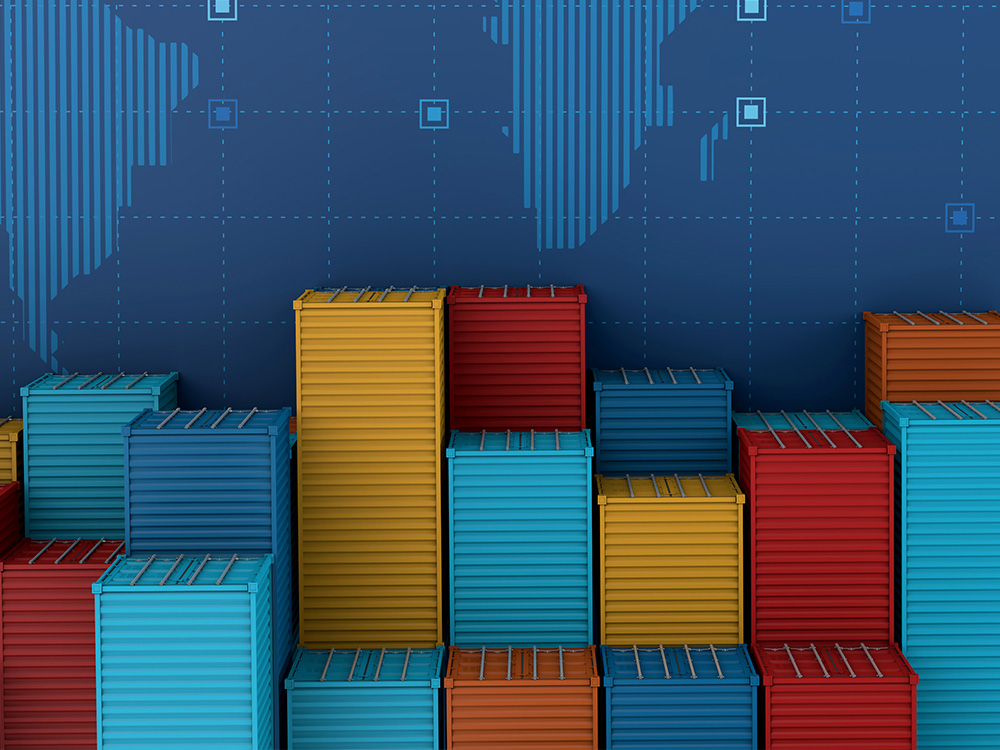
The International Trade Newsletter aims to provide information about recent news, trends and government guidelines in Brazil and abroad regarding trade, market access, trade remedies, import tariffs and competitiveness. This material is for informational purposes and should not be used for decision-making. Specific legal advice can be provided by our lawyers.
Enjoy reading!
International Trade Team
New European regulation on products originating from deforested or environmentally degraded areas (“Deforestation Act”) published
On June 09, 2023, the European Union (“EU”) published the Deforestation Act, a regulation that introduces new rules for imports of agricultural commodities and their derivatives associated with deforestation and environmental degradation.
The commodities provided for in the regulation are cattle, cocoa, coffee, palm oil, soy, wood and rubber; while derivatives include bovine hides and skins, chocolates, furniture and woodworks, paper, tires and natural rubber, among others (“relevant products”). Only products originating from forest areas that have not been subject to deforestation or environmental degradation after December 31, 2020, will be considered as “deforestation-free”.
In order to enter the relevant products into the European Union, the operator must submit a due diligence statement containing the tracking information of the production chain. The document will be mandatory to prove that the production is not involved in deforestation or environmental degradation of forests. Although the statement must be provided by the European importer, obligations regarding control, registration, availability and proof of information can fall on Brazilian producers and suppliers, who must be prepared to provide and submit proof of any required information.
The appropriate EU authorities must carry out periodic checks to verify the accuracy of the information provided. These checks will primarily include the examination of companies’ internal systems and of the auditing processes used to submit the due diligence statement, as well as the analysis of documentation and records used to attest to the products’ compliance with the regulation.
The regulation also provides for the use of additional verification mechanisms, such as:
- the use of satellite image remote monitoring tools to determine if the products come from deforested regions;
- DNA analysis to determine the origin of the products; and
- on-site verifications, including potential audits in the headquarters of Brazilian producers, provided that the Brazilian government agrees to such audits by means of a cooperation agreement.
The EU will rank its trading partners in benchmarks according to the risk (low, standard or high) they present in regard to deforestation and environmental degradation. Initially, countries are assumed to present a standard risk, and the list of countries – or regions – presenting low or high risk must be published no later than 18 months after the regulation enters into force.
Low-risk countries will be subject to a simplified due diligence procedure and a lower percentage of imports from these regions will be checked by the appropriate authorities (only 1% compared to 3% of imports from standard-risk regions and 9% of imports from high-risk regions).
Penalties for operators who fail to comply with the regulation have yet to be defined by EU member states, but will include:
a) fines that are proportional to the environmental damage caused and to the value of the related products; for legal entities, the fine must be of up to 4% of the company’s annual turnover in the EU;
b) confiscation of the relevant products from the operator or trader;
c) confiscation of revenue from transactions involving relevant products;
d) temporary exclusion from public procurement procedures (for a maximum of 12 months);
e) temporary ban on imports of relevant products into the European Union market in case of serious or repeated infringements; and
f) ban on the use of the simplified due diligence procedure.
Read the published regulation in full here.
Brazil withdraws offer to accession to WTO’s Government Procurement Agreement
On May 30, 2023, Brazil announced[1] that it has withdrawn its offer to open the country’s public procurement market to foreign companies in the context of completing its process of accession to the World Trade Organization’s (“WTO”) Government Procurement Agreement (“GPA”).
Brazil had submitted an initial proposal[2]to enter into the GPA on May 18, 2020[3], in order to foster the reduction of public expenditures and to improve the quality of government procurement of goods and services, as well as to encourage Brazilian exports and foreign investments[4].
On November 25, 2021,[5] a revised offer for access to the GPA was presented, expanding the number of government entities that would open their bids to foreign companies.[6] Brazil, however, opted to withdraw this offer due to concerns regarding the scope of the previous proposal, which could limit the potential for public policies aimed at industrial development within the country.
According to the Secretary of Foreign Trade, Tatiana Prazeres, the topic would also impact the ongoing bilateral negotiations between the Southern Common Market (“Mercosur”) and the European Union: “It is not convenient for Brazil to present a more comprehensive and ambitious proposal to a larger group of countries through the WTO, which includes members of the European Union, while we are currently under bilateral negotiations on the same topic with the European Union. This would mean giving up bargaining power in current and future bilateral negotiations,” she stated to the press.[7]
[1] https://www.gov.br/mre/pt-br/canais_atendimento/imprensa/notas-a-imprensa/retirada-da-oferta-do-brasil-para-acessao-ao-acordo-de-contratacoes-governamentais-da-omc
[2] https://www.wto.org/english/news_e/news20_e/gpro_19may20_e.htm
[3]https://docs.wto.org/dol2fe/Pages/FE_Search/FE_S_S006.aspx?DataSource=Cat&query=%40Symbol%3d%22GPA%2f152%22+OR+%40Symbol%3d%22GPA%2f152%2f*%22&Language=English&Context=ScriptedSearches&languageUIChanged=true
[4] https://www.poder360.com.br/economia/brasil-formaliza-oferta-na-omc-para-abrir-mercado-de-compras-governamentais/
[5] https://www.gov.br/mre/en/contact-us/press-area/press-releases/joint-press-release-by-the-ministry-of-external-relations-and-the-ministry-of-economy-brazil-presents-offer-for-accession-to-the-agreement-on-government-procurement
[6] https://www.poder360.com.br/governo/brasil-revisa-oferta-de-adesao-ao-acordo-de-compras-governamentais-da-omc/
[7] https://valor.globo.com/opiniao/assis-moreira/coluna/compras-governamentais-apos-recuo-na-omc-ajuste-com-a-ue.ghtml
European Commission publishes draft regulation with guidelines on transition period of Carbon Border Adjustment Mechanism
On June 13, 2023, the European Commission published draft regulations for the implementation of the Carbon Border Adjustment Mechanism (“CBAM”) (Implementing regulation on reporting obligations during the transitional period of the CBAM).
CBAM was created by a regulation published on May 10, 2023, and aims to regulate the carbon emissions incorporated in the imports of certain products (cement, electricity, fertilizers, hydrogen and iron derivatives, steel and aluminum), carried out by the European Union.
During the CBAM transition period – which will commence in October 2023 and end in December 2025 – importers will be subject to the obligation to inform, by means of a declaration submitted to the European Commission, emissions of greenhouse gases subject to the measure that are incorporated in the products (“CBAM declaration”). The first CBAM declaration is expected to be submitted by January 31, 2024 (on imports from the fourth quarter of 2023), and the last CBAM report is expected to be submitted by January 31, 2026 (on imports from the fourth quarter of 2025).
The draft provides important clarifications that will prepare importers for the transition period, including the following:
- The definition of who may submit CBAM reports (“declarant”), which may be:
I – the importer who submits a customs declaration;
II- the importer who declares the import of goods; and
III – the indirect customs representative, upon agreement or if the importer is established in a third country;
- The main duties of the declarant are:
-
- To report the quantity and types of goods imported.
- To identify the country of origin of the goods.
- Provide information on the facilities where they were produced (including the address and geographic coordinates), the production routes used, the direct embedded emissions and, for steel products, the identification number of the steel mill where the batches of raw material came from, when known.
In addition, the CBAM implementation regulation provides:
- further detailed methods for calculating direct and indirect emissions;
- information to be required in the CBAM report about the price of carbon in the country of origin;
- the structure that must be followed upon submission of the CBAM report (available in Annex I);
- further detailed rules on the evaluation of CBAM reports; and
- further detailed rules on penalties.
Interested parties can provide their comments on the draft by July 11, 2023. The regulation will enter into force on the day following its publication and will be binding on all EU Member States.
New Decree provides for the production and disclosure of Brazil’s official foreign trade statistics
On June 02, 2023, Decree No. 11,544/2023[1] was published, which aims to regulate the production and disclosure of official statistics regarding the Brazilian foreign trade.
The Secretariat of Foreign Trade (“SECEX”) of the Ministry of Development, Industry and Foreign Trade (“MDIC”) was assigned as the entity responsible for the production and disclosure of these statistics[2].
According to the Decree, the following foreign trade statistics will be created:
I – detailed primary statistical information on exports and imports;
II – derived statistical information; and
III – reports, analyses, foreign trade statistical studies, manuals and methodological notes.
The Decree further clarifies that any information relating to the economic, financial or business standing of Brazilian companies or third parties, including the nature and status of their business or activities protected by the right to privacy, will not be disclosed. Information will be processed and disclosed in an aggregated manner so as not to allow, directly or indirectly, the identification of sensitive underlying matters.
In addition, according to the decree, the disclosure of export and import statistics will be carried out on a monthly basis. SECEX will offer guidelines for the use of statistics, as well as customer service and training actions for users of foreign trade statistics.
The new rule was inspired by documents such as the code of good practices of the Brazilian Institute of Geography and Statistics (“IBGE”), the principles governing international statistics of the United Nations (UN), and the recommendations on good statistical practice of the Organization for Economic Co-operation and Development (OECD).
[1] https://portal.in.gov.br/en/web/dou/-/decreto-n-11.544-de-1-de-junho-de-2023-487666246
[2] https://valor.globo.com/opiniao/assis-moreira/coluna/compras-governamentais-apos-recuo-na-omc-ajuste-com-a-ue.ghtml
International trade and sustainable development: MDIC’s Executive Secretariat opens public consultation
On June 05, 2023, the Executive Secretariat of the MDIC opened a public consultation to receive comments and suggestions on the increasing interaction between international trade and sustainable development.
The public consultation follows the authorization, granted by the Strategic Council of the Brazilian Foreign Trade Chamber (“CEC”) on May 16, 2023, for the creation of the Working Group on Trade and Sustainability (“GT Sustentabilidade”) under the Foreign Trade Chamber (“CAMEX”).
CEC emphasized the need to coordinate Brazil’s responses to environmental protection measures that have been recently adopted by certain countries to mitigate climate change, which have a high potential to impact international trade.
The discussions on the interaction between international trade and sustainable development are at the heart of the international community’s attention and are part of the agenda of important international forums, such as the WTO, the Group of 20 (G20), the five regional economies encompassing Brazil, India, China and South Africa (“BRICS”) and Mercosur, in addition to being part of the negotiation of chapters and clauses of trade agreements around the world.
According to the MDIC, the purpose of the public consultation is to collect contributions from the Brazilian society on different topics that arise from the relationship between international trade and sustainable development, including its economic, social and environmental aspects, in order to contribute to the structuring of Brazil’s positioning in international trade negotiations and debates within international organizations.
The public consultation includes 49 items available for contribution, which comprehend wide-ranging topics, among which the following stand out:
- Non-tariff trade barriers.
- Regulation of environmental goods and services.
- Circular economy.
- Green subsidies.
- Reduction of plastic waste and fostering of a more sustainable plastics trade for the benefit of the environment.
- Competitive concerns due to the cutback in tariff and non-tariff barriers within Brazil for:
- international environmental goods and services;
- international goods of the circular economy; and
- goods regarded as substitutes for plastics.
- Inclusion, by the Brazilian government, of clauses and chapters that seek to ensure, in trade agreements:
- compliance with international rules and conventions for labor rights;
- the stimulation of economic development; and
- the fostering of social protection.
Contributions, comments and suggestions can be submitted by August 04, 2023.
Access the full draft of the public consultation on the “Participa +Brasil” platform. Contributions must also be submitted through the same platform.
Related Areas














